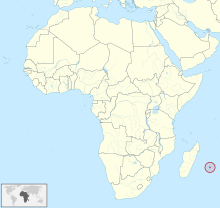留尼汪雁
留尼汪雁(學名:Alopochen kervazoi),又稱科爾瓦佐埃及雁(Kervazo's Egyptian goose),是留尼汪島上一種已經滅絕的埃及雁屬鳥類[2][3],曾分佈於留尼汪島。其親緣關係與埃及雁很近,體型相較下稍小,翼部骨骼(尺骨和掌骨)長度略微減小,而股骨長度略微增加;喙更短、與頭骨連接處延伸更深,呈半圓形,龍骨突前緣直而並不凹陷[4][5]。其飛行能力相比埃及雁可能稍有降低,其他特徵也表現出島嶼適應性[4]。
| 留尼汪雁 | |
|---|---|

| |
| 朱利安·彭德·休姆為留尼汪雁(左側較大者)和毛里裘斯鴨(右側較小者)所繪的復原圖 | |
| 科學分類 | |
| 界: | 動物界 Animalia |
| 門: | 脊索動物門 Chordata |
| 綱: | 鳥綱 Aves |
| 目: | 雁形目 Anseriformes |
| 科: | 鴨科 Anatidae |
| 屬: | 埃及雁屬 Alopochen |
| 種: | †留尼汪雁 A. kervazoi
|
| 二名法 | |
| †Alopochen kervazoi (Cowles, 1994)
| |

| |
| 留尼汪島方位 | |
| 異名 | |
|
Mascarenachen kervazoi Cowles, 1994 | |
威廉·邦特科埃曾在1619年便提及留尼汪島上有雁存在[6],但明確的描述僅見於西厄爾·迪布瓦1674年的一段文字:
一種野雁,比歐洲雁略小。羽毛也相同,但喙和腳更紅一些。相當美味。
Wild geese, slightly smaller than the European geese. They have the same feathering, but with the bill and feet red. They are very good [to eat].[7]
1974年,伯特蘭·科爾瓦佐(Bertrand Kervazo)在大法蘭西岩洞(Grottes des Premiers Français)發現其亞化石骨骼[7]。這是該物種的模式標本,目前存放在法國國家自然歷史博物館[6];其他部分標本也存放於里昂第一大學和留尼汪自然歷史博物館[8]。
分類
編輯1994年,格雷厄姆·斯圖爾特·考爾斯通過對留尼汪雁的化石研究,將其劃歸到新屬Mascarenachen,並冠以學名Mascarenachen kervazoi以紀念最先發掘出化石的科爾瓦佐(Kervazo)。1999年,賽西爾·穆雷-肖維雷經過進一步研究,最終認定屬於埃及雁屬[4]。
滅絕
編輯早在1667年,弗朗索瓦·馬丁就曾描述過聖保羅湖的水禽遭到棲息地破壞,並批評道捕獵活動不可持續,這表明留尼汪島上的水禽曾遭到過度捕獵[6][9]。該物種可能的最後一次記錄是德拉梅爾韋耶(de la Merveille)1709年的一份清單,他聲稱鴨子和鵝「數量眾多」,但讓·費耶在1705年的留尼汪島動物目錄中卻並未列出水鳥,德·拉·梅爾維爾的記錄大概率是道聽途說而來的過時消息。因此,該物種的最後一次記錄便追溯到貝爾納丹神父1687年的報告[來源請求]。該物種可能在1690年代因過度捕獵而滅絕[10],引入的掠食者也有可能捕食蛋和雛鳥[7]。
參考資料
編輯- ^ BirdLife International. Alopochen kervazoi. The IUCN Red List of Threatened Species. 2016, 2016: e.T22729490A95017764 [12 November 2021]. doi:10.2305/IUCN.UK.2016-3.RLTS.T22729490A95017764.en (英語).
- ^ International Ornithologists' Union. IOC World Bird List 12.1 (Multilingual Version). [2022-08-17]. doi:10.14344/ioc.ml.12.1. (原始內容存檔於2022-04-01) (英語).
- ^ Tobias, J. A.; Sheard, C.; Pigot, A. L.; Devenish, A. J. M.; Yang, J.; Sayol, F.; Neate‐Clegg, M. H. C.; Alioravainen, N.; Weeks, T. L.; Barber, R. A.; Walkden, P. A. AVONET: Morphological, Ecological and Geographical Data for all Birds. Ecology Letters. 2022, 25 (3) [2022-08-17]. ISSN 1461-023X. doi:10.1111/ele.13898. (原始內容存檔於2022-08-07) (英語).
- ^ 4.0 4.1 4.2 Mourer-Chauviré, Cécile; Bour, Roger; Ribes, Sonia; Moutou, Francois. The avifauna of R{\'e}union Island (Mascarene Islands) at the time of the arrival of the first Europeans (PDF). Smithsonian contributions to paleobiology. 1999, 89: 1-38 [2024-06-21] (英語).
- ^ Mourer-Chauviré, Cécile; Bour, Roger; Sonia, Ribes. Recent avian extinctions on Réunion (Mascarene Islands) from paleontological and historical sources. Recent avian extinctions.. Bulletin of the British Ornithologists' Club. London: British Ornithologists' Club. 2006-06-05 [2024-07-06] (英語).
- ^ 6.0 6.1 6.2 Reunion Shelduck (Alopochen kervazoi) - BirdLife species factsheet. datazone.birdlife.org. [2024-07-05]. (原始內容存檔於2024-03-04) (英語).
- ^ 7.0 7.1 7.2 Hume, J. P. Extinct Birds 2. Bloomsbury Natural History. 2017: 50. ISBN 978-1-4729-3744-5.
- ^ Alopochen kervazoi. paleobiodb.org. [2024-07-06]. (原始內容存檔於2024-07-06).
- ^ 9.0 9.1 Cheke, A. S.; Hume, Julian P. Lost land of the dodo: an ecological history of Mauritius, Réunion & Rodrigues. London: T & AD Poyser. 2008. ISBN 978-0-7136-6544-4. OCLC 69484453 (英語).
- ^ Clements, J. F.; Schulenberg, T. S.; Iliff, M. J.; Billerman, S. M.; Fredericks, T. A.; Gerbracht, J. A.; Lepage, D.; Sullivan, B. L.; Wood, C. L. The eBird/Clements checklist of Birds of the World: v2021.. 2021 [2022-08-17]. (原始內容存檔於2020-01-01).
- Cowles, Graham S. (1994): A new genus, three new species and two new records of extinct Holocene birds from Réunion Island, Indian Ocean. Geobios 27(1): 87–93.
